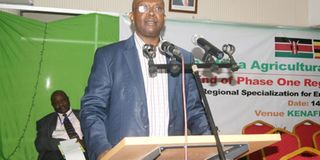Continental body seeks to support 1.5m smallholders

Prof Nuhu Hatibu,
What you need to know:
- Agra is a partnership which works across Africa, and is now in its third five-year phase from January 2017, during which it plans to spend $28.3 million in Tanzania. Agra’s zonal head for Tanzania, Rwanda and Uganda, Prof Nuhu Hatibu, said they want to make sure that the income of each of the 1.5 million smallholder farmers targeted exceeds the country’s per capita income that was estimated at $1,021 in 2017. “The fifth phase government of Tanzania under President John Magufuli is talking about industrialisation, and Agra in its third term stresses commercialising agriculture, thereby making smallholder farmers rich,” Prof Hatibu stated.
Dar es Salaam. The Alliance for a Green Revolution in Africa (Agra) is planning to dwell upon the priorities listed in Tanzania’s recently-launched second Agriculture Sector Development Programme (ASDP-II) which seek to positively impact the lives of 1.5 million smallholder farmers in the country.
Agra is a partnership which works across Africa, and is now in its third five-year phase from January 2017, during which it plans to spend $28.3 million in Tanzania. Agra’s zonal head for Tanzania, Rwanda and Uganda, Prof Nuhu Hatibu, said they want to make sure that the income of each of the 1.5 million smallholder farmers targeted exceeds the country’s per capita income that was estimated at $1,021 in 2017. “The fifth phase government of Tanzania under President John Magufuli is talking about industrialisation, and Agra in its third term stresses commercialising agriculture, thereby making smallholder farmers rich,” Prof Hatibu stated.
“We will support the crops prioritized in ASDT-II – which is also well-positioned to transform agricultural systems and increase the productivity and income of smallholder farmers. We can help to ensure food security of the country without necessarily restricting the export of cereals,” he added.
Agra’s mission is to trigger a revolution that transforms agriculture into a highly-productive, competitive and sustainable system that assures food security even as it lifts millions out of poverty.
The planned investment will focus on supporting the government of Tanzania in planning, coordinating, implementing and creating an enabling environment, Prof Hatibu explains.
The initiative includes partnering with the government in the roll-out of ASDP-II, and strengthening coordination and delivery in the agricultural sector – as well as creating an environment enabling policy that attracts increased private sector investments. Investments should focus on scaling up agri-systems and farmer-level initiatives in three selected priority agro-economic zones (AEZs), and enhancing supply chains efficiency through effective agribusiness deal-making platforms.
Furthermore, they should aid in expanding market access through value-addition, structured trade, quality enhancement and aggregation; as well as strengthen input supply systems and linkages to output markets to facilitate the uptake of yield-enhancing agricultural technologies.
Agriculture accounts for 30 per cent of Tanzania’s GDP, and employs nearly 70 per cent of the working population.




